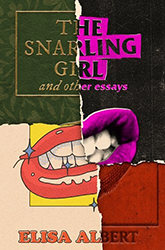“Storytelling isn’t just how we construct our identities; stories are our identities,” remarked John Holmes, Professor Emeritus of the University of Waterloo. In her memoir, Departure Stories, Elisa Bernick uses Holmes’s assertion as an epigraph, which remains central as she recounts her traumatic childhood growing up Jewish and with divorced parents in Minnesota in the 1960s and 1970s.
At the root of Bernick’s troubles was her mother, Arlene, whose abuse and mental instability stemmed from a lack of financial freedom in her marriage, unhappiness in her family life, and negligible career opportunities. Arlene’s rage and depression led her to abandon her children — leaving Elisa, the second of four, to care for her younger siblings at a very young age.
Instead of blaming her, Bernick holds her mother’s violence up to the historical moment around her; she illustrates how antisemitism in Minnesota and the suffocating expectations for young mothers were the cages from which her mother spent her whole life trying to escape. She details her mother’s struggle to reconcile her devotion to her Jewish faith with her desire to be a white, middle-class, suburban woman. Bernick recalls the norms dictated by “Minnesota Nice,” a term indicating that it’s impolite to acknowledge differences in one’s neighbors. Assimilation, in other words, was the only way.
Being Jewish and having divorced parents made Bernick a unicorn of sorts. At a time when divorce was new and the Jewish population of Minnesota small, she didn’t know anyone else like her.
Bernick has created a hybrid narrative in which chapters mostly alternate between memories and essays, with the occasional sections that consist solely of jokes, recipes, quotations, lists, and definitions. While the cover art is a bit quirky, resembling a Jewish cookbook, Bernick’s storytelling is ambitious and intellectually stimulating. She contemplates reality and truth as she reflects on interviews with her parents and siblings, integrating research on trauma, memory, and the impact of divorce on children. In the process, she acknowledges that it’s possible that she has purposefully forgotten or altered certain memories in order to cope.
Ultimately, Bernick is clear about wanting to tell her family’s story of divorce, abuse, aberration, and suffering not as a means of simply venting and raging, but as a way to say that things can be different for the next generation. Now a happy mother and wife, she ends the book with an extensive appendix of selected timelines highlighting Jewish migration in Minnesota and important events in her family’s history.
Jamie Wendt is the author of the poetry collection Laughing in Yiddish (Broadstone Books, 2025), which was a finalist for the 2022 Philip Levine Prize in Poetry. Her first book, Fruit of the Earth (Main Street Rag, 2018), won the 2019 National Federation of Press Women Book Award in Poetry. Her poems and essays have been published in various literary journals and anthologies, including Feminine Rising, Catamaran, Lilith, Jet Fuel Review, the Forward, Minyan Magazine, and others. She contributes book reviews to the Jewish Book Council. She won third prize in the 2024 Reuben Rose Poetry Competition and won second prize for the 2024 Holloway Free Verse Award through the Illinois State Poetry Society. Wendt holds an MFA in Creative Writing from the University of Nebraska Omaha. She lives in Chicago with her husband and two kids. Follow her online at https://jamie-wendt.com/ or on Instagram @jamiewendtpoet.





